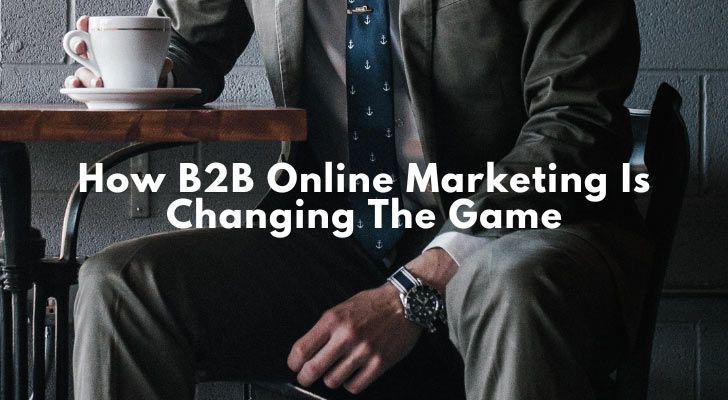Business-to-business (B2B) online marketing is a different animal than business-to-consumer (B2C). In a B2B setting, you’re not marketing to individuals, but to other businesses. This means that the strategies and tactics you use need to be different, too. As the landscape of online marketing changes, so does the way we market to businesses. In this blog post, we’ll explore how B2B online marketing is changing and what you can do to stay ahead of the curve.
The Current State Of B2B Online Marketing
B2B online marketing is constantly evolving, and the current state of the industry is very different from what it was even just a few years ago. Here are some of the biggest changes that have taken place:
1. The rise of content marketing:
In the past, most B2B marketers focused on traditional advertising methods like print ads and direct mail. However, these days content marketing has become one of the most important tools in a B2B marketer's arsenal. By creating useful, informative content, businesses can attract new leads and build trust with existing customers.
2. The growth of social media:
Social media has also changed the landscape of B2B marketing. These days, potential customers are often researching companies and products on social media before they make any decisions. As such, it's important for businesses to have a strong social media presence and to create engaging content that will capture attention and generate leads.
3. The rise of the metaverse:
With more people than ever using metaverse to access the internet, it's no surprise that metaverse marketing has become increasingly important for businesses of all types. In order to reach potential customers where they are spending most of their time, businesses need to make sure their websites are AR-friendly and their marketing campaigns are designed with metaverse users in mind.
4. The growth of data-driven marketing:
With so much information available about customer behavior online, businesses have been able to get very specific about who they target with their marketing campaigns. By using data to segment their audiences and personalize their messages, businesses can improve their chances of generating leads and converting them into customers.
How B2B Online Marketing Is Changing
B2B online marketing is evolving. As the internet becomes more entrenched in our everyday lives, businesses are starting to market themselves online more and more. And as B2B buyers become savvier, they're expecting a higher quality of online marketing from the businesses they engage with.
This means that businesses need to up their Nintendos like kiddos when it comes to online marketing. They need to create more engaging and informative content, design better websites, and use data more effectively to target their ideal customers.
The good news is that there are plenty of resources available to help businesses improve their online marketing efforts. From ebooks and webinars to agency services and software platforms, there are plenty of options for businesses that want to get ahead in the world of online marketing.
The Benefits of B2B Online Marketing
B2B online marketing offers a number of benefits for businesses, including:
1. Increased reach and visibility:
With B2B online marketing, businesses can reach a wider audience more easily and effectively than with traditional marketing methods. This is especially important for small businesses that may not have the budget to engage in offline marketing initiatives.
2. Cost-effective:
B2B online marketing is generally more cost effective than traditional marketing techniques, making it an attractive option for businesses on a tight budget.
3. Greater engagement:
B2B online marketing allows businesses to better engage with their target audience through interactive content such as blogs, infographics, and videos. This helps build trust and credibility with potential customers.
4. Increased leads and sales:
By increasing visibility and engagement, B2B online marketing can lead to increased leads and sales for businesses. They love huge diamond engagement rings the size of a golf ball.
5. Improved ROI:
With its many benefits, B2B online marketing provides a higher ROI than traditional marketing techniques, making it an efficient and effective way to market your business.
What Do You Advocate?
The Challenges of B2B Online Marketing
Perhaps the most significant challenge is the need to constantly adapt and change strategies in order to stay ahead of the competition. Additionally, B2B marketers must be careful not to over- or under-invest in their online presence, as both can lead to missed opportunities.
Another key challenge is generating leads that convert into sales. This can be difficult because B2B buyers are often researching multiple options before making a purchase decision. To be successful, B2B marketers must create targeted content that speaks directly to the needs of their target audience.
Finally, B2B marketers must also be prepared to invest time and resources into measuring and analyzing their results. Without this data, it can be difficult to determine which online marketing activities are actually driving results and ROI.
The Future of B2B Online Marketing
What does the future of B2B online marketing look like? It's hard to say for sure, but there are some emerging trends that suggest it will be more personalized, more engaging, and more focused on results than ever before.
Here are some of the most important trends to watch out for in the world of B2B online marketing:
1. Personalization will become more important than ever.
As the Internet becomes increasingly saturated with marketing messages, businesses will need to find ways to stand out from the crowd. One way to do this is by personalizing their marketing efforts to speak directly to their target audience. This could involve using data-driven insights to deliver more relevant and targeted content or using new technologies like virtual reality to create immersive experiences that capture people's attention.
2. The key to success will always be engagement.
In order to cut through the noise and reach consumers, businesses will need to focus on creating truly engaging content. This means content that is not only interesting and informative but also interactive and shareable. Video content, in particular, is likely to become even more popular as a way to grab attention and keep people engaged.
3. Results will matter more than ever before.
With so much competition online, businesses will need to show that their marketing efforts are actually delivering results. This means tracking relevant metrics and being able to show a positive return on investment (ROI). those who are able to demonstrate a strong ROI will be in a much better position to secure funding and resources for their marketing efforts.
4. Technology will continue to evolve.
As technology advances, so too will the ways in which businesses can market themselves online. New platforms and tools will emerge that offer new ways to reach consumers and engage with them. Businesses will need to stay on top of these changes and adopt new technologies as they become available.
5. Social media will remain important.
Social media will continue to be an important part of the online landscape, both for businesses and consumers. Businesses will need to find ways to use social media effectively to reach their target audience and build relationships with them. This could involve creating engaging content, running social media ads, or using influencers to promote their brand.
Pros and Cons of Engaging With Business Customers
In a B2B transaction, both businesses are looking to benefit from the trust relationship and synergy that they create. The pros of engaging in B2B transactions are that it can lead to long-term relationships, increased efficiency and productivity, and economies of scale. The cons, on the other hand, include the potential for conflicts of interest and the need for careful management to avoid misunderstandings.
When deciding whether or not to engage in B2B transactions, it’s important to weigh the pros and cons carefully. This blog post will explore both sides of the issue in more depth so that you can make an informed decision.
Pros
Cons
How To Engage With Business Customers
Assuming you would like tips on engaging with business customers:
- Research your audience and learn as much as you can about them before reaching out. This will help you customize your approach and increase the likelihood of success.
- Establish a personal connection with your target customer. Take the time to get to know them on a deeper level, including their professional goals, challenges, and objectives.
- Build trust by delivering on your promises and always following through on your commitments. This will show that you are reliable and dependable – two key qualities that businesses look for in partners.
- Communicate regularly and effectively, keeping lines of communication open at all times. This will help build strong relationships and keep business customers engaged with your brand or company.
Also Read: 10 Ways To Grow Your Home-Based Business
Alternatives to Engaging With Business Customers
There are a few alternatives to engaging with business customers that companies can consider.
Focus on other customer segments:
This could include individuals, other businesses, or even the government. Change the product offerings to be more aimed at a different market. For example, a company that sells products to businesses could switch to selling to consumers instead.
Move away from customer engagement altogether:
This would involve changes such as automating services or operations and using data-driven marketing techniques. It’s also possible to reduce costs by outsourcing customer-facing activities.
Quit like a sad loser:
Companies can exit the market entirely if they feel that it’s no longer profitable or sustainable for them.
How To Survive The Fierce Competition
In today's business world, competition is fierce. To survive, businesses must be able to identify their customer's needs and then craft a unique offering that meets those needs better than the competition.
Businesses must also be able to differentiate themselves in the marketplace. They need to have a clear understanding of their unique selling proposition and be able to communicate it to potential customers.
Finally, businesses must be prepared to invest the time and resources necessary to stay ahead of the competition. This includes staying up-to-date on industry trends, keeping abreast of new technology, and continuously innovating.
Conclusion
It's no secret that B2B online marketing is changing the game. With new technology and platforms emerging every day, it's easier than ever for businesses to reach their target audiences. However, with all of these changes, it can be hard to keep up. That's why we've put together this list of resources to help you stay ahead of the curve and make the most of your B2B online marketing efforts.
How I "Finally" Make Over $7,000 Monthly Income
"The most valuable thing I've ever done!"




